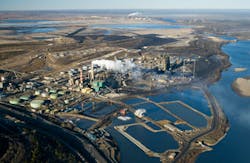Development of tar sands in North America has proved controversial, with opposition commonly taking the form of blockades, petitions and calls for businesses and organizations to divest their interests in the industry.
Public opposition to pipelines and other expanded investment in tar sands production is leading to delays and project cancellations, according to a new report by the Institute for Energy Economics and Financial Analysis (IEEFA) and Oil Change International.
The report, which seeks to quantify for the first time the financial and carbon impact of public opposition to tar sands projects, says that citizen protests are having a measurable negative impact on the bottom line of the tar sands industry. It estimates that from 2010 through 2013 the industry lost $30.9 billion of revenue, partly because of the changing North American oil market but largely because of a fierce grassroots movement against tar sands development.
Some 55 percent of the lost revenue, or $17 billion, is attributed to citizen protests against pipelines and tar sands.
Just this year, market forces and public opposition have played a significant role in the cancellation of three major tar sands projects: Shell's Pierre River, Total's Joslyn North and Statoil's Corner Project.
The report suggests that the combination of risks facing the industry has the potential to stop most or even all of the planned expansion of the industry in Canada.
Tom Sanzillo, director of finance at IEEFA, and one of the lead authors of the report, said that tar sands producers face "a new kind of risk" from growing public opposition.
According to Steve Kretzmann, executive director of Oil Change International, industry officials failed to anticipate the level and intensity of public opposition to their build-out plans.
"Public opposition has caused government and its administrative agencies to take a second and third look. Legal and other challenges are raising new issues related to environmental protection, indigenous rights and the disruptive impact of new pipeline proposals," he commented.
"Business as usual for Big Oil — particularly in the tar sands — is over," Kretzmann concluded.
